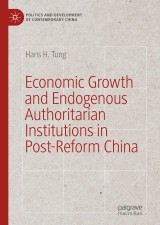Details

Economic Growth and Endogenous Authoritarian Institutions in Post-Reform China
Politics and Development of Contemporary China
|
74,89 € |
|
| Verlag: | Palgrave Macmillan |
| Format: | |
| Veröffentl.: | 30.01.2019 |
| ISBN/EAN: | 9783030048280 |
| Sprache: | englisch |
Dieses eBook enthält ein Wasserzeichen.
Beschreibungen
<div><div>This book analyzes the dynamic political economy of authoritarian institutions in China and attempts to answer the following questions: What is the significance of China's authoritarian institutions and the changes Xi Jinping has brought to them? Why did the Chinese elites go along with the changes that affected them negatively? Through these questions, the author unravels the mechanics of authoritarian resilience as well as its dynamics. The work reviews both literatures on China studies and comparative authoritarianism to introduce a general framework for analyzing authoritarian institutional change under dictatorships.</div></div><div><br></div><div><br></div>
1. Chapter 1 Introduction.- 2. Chapter 2 Why? A Dynamic Theory of Power and Plenty Under Dictatorships.- 3. Chapter 3 How? The Dictator’s Divide-and-Rule Strategy.- 4. Chapter 4 Authoritarian Institutions, China Style.- 5. Chapter 5 Dictator’s Growth Curse and China’s Trade Politics.- 6. Chapter 6 Still an Era of Fragmented Authoritarian 1.0? A Probabilistic Crucial Case Analysis.- 7. Chapter 7 Authoritarian Power-Sharing Under Collective Leadership and China’s Trade Policy-Making.- 8. Chapter 8 Theoretical Extensions: Unbundling Authoritarian Institutions and Their Changes Under Xi Jinping.- 9. Chapter 9 Divide-and-Conquer Strategy and Political Sociology of the Dictator’s Commitment Power in China.- 10. Chapter 10 Conclusions.
<div><div><div><div><b>Hans H. Tung</b> is Assistant Professor in the Department of Political Science and Research Associate of the Center for Research in Econometric Theory and Applications at National Taiwan University, Taiwan.</div></div></div></div><div><br></div>
<div><div><div>This book analyzes the dynamic political economy of authoritarian institutions in China and attempts to answer the following questions: What is the significance of China's authoritarian institutions and the changes Xi Jinping has brought to them? Why did the Chinese elites go along with the changes that affected them negatively? Through these questions, the author unravels the mechanics of authoritarian resilience as well as its dynamics. The work reviews both literatures on China studies and comparative authoritarianism to introduce a general framework for analyzing authoritarian institutional change under dictatorships.</div><div> </div><div><b>Hans H. Tung</b> is Assistant Professor in the Department of Political Science and Research Associate of the Center for Research in Econometric Theory and Applications at National Taiwan University, Taiwan.</div></div></div><div><br></div>
The first systematic study of China’s authoritarian institutions and their change during Xi Jinping’s first term Answers important questions about the trajectory of China’s authoritarian institutional change during the post-reform era Critically examines the current literatures on comparative authoritarianism and political economy of China
“Whether for those disbelieving without a formal model or simply wishing for a delightfully coherent analysis of China's precarious decision structure, particularly related to the topical issue of trade policy, Professor Tung's book is a gratifying read.” (Gary H. Jefferson, Carl Marks Professor of International Trade and Finance, Brandeis University, USA)<p>“It is rare for any book to address multiple theoretical puzzles simultaneously. Yet, Professor Tung's book has done so with great finesse and rigor, and provides new theoretical insights on the impact of growth on authoritarian stability and dictators' divide and conquer strategy. It is not to be missed by students of political economy and comparative politics.” (Victor C. Shih, Associate Professor of Political Economy, UC San Diego, USA, and author of Factions and Finance in China: Elite Conflict and Inflation (2007))<br></p>
Diese Produkte könnten Sie auch interessieren:

Herausforderungen und Chancen eines künstlerischen Wettbewerbs für ein Mahnmal in Gedenken an die Opfer des 19. Februar 2020 in Hanau

von: Katharina Meyer zu Eppendorf

29,99 €

Der erste arabisch-israelische Krieg und seine Folgen für die Palästinenser

von: Dean Sánchez Pedregoso

15,99 €














